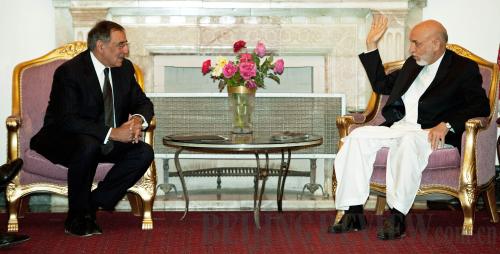|
 |
|
BOLSTERING TIES: New U.S. Secretary of Defense Leon Panetta (left) meets Afghan President Hamid Karzai in Kabul on July 9 during a trip to Afghanistan shortly after taking office (XINHUA/AFP) |

U.S. President Barack Obama outlined steps for the United States' withdrawal from Afghanistan on June 23. This strategic adjustment comes at a critical juncture as the United States re-evaluates the war in Afghanistan, which has been ongoing for almost a decade.
A comprehensive plan
The United States' exit strategy involves much more than removing troops from Afghanistan. It is a comprehensive plan covering military, political and diplomatic aspects of the U.S. mission in the country.
Before the end of this year, the United States will pull out 10,000 soldiers. By September 2012, another 23,000 will be withdrawn. This will mark the removal of all the troops added by Obama's troop surge strategy in 2009. The United States will gradually withdraw according to developments on the ground and will ultimately shift its role from an active to a supporting one. By 2014, Afghanistan's security forces will play the leading role in defending the nation.
Politically, the troop withdrawal has the potential to accelerate Afghanistan's national reconciliation. Already, the United States has shifted away from its steadfast policy of non-communication with the Taliban. Obama has said the United States is willing to negotiate with the Taliban. In order for this to happen, he said, the Taliban would have to give up violent means of achieving its goals, part ways with Al Qaeda and obey Afghanistan's Constitution. The United States has held several talks with the Taliban in Qatar and Germany since the beginning of this year.
Diplomatically, the plan will continue to press Pakistan to step up anti-terrorist efforts. Obama has clearly stated that the United States will urge Pakistan to intensify strikes against extremists and terrorists within its borders and will not tolerate terrorists using Pakistan as a safe haven. At the same time, the United States is busy drawing Afghanistan's neighboring countries to its side to solve problems in the conflict-ridden country. For instance, Richard Haass, President of the U.S. Council on Foreign Relations, has recently proposed the "six-plus-two" approach, involving China, Russia, Saudi Arabia, Iran, India and Pakistan plus America and Afghanistan, to address the Afghanistan issue.
The U.S. withdrawal is a fixed agenda, but exactly how it will play out has yet to be seen and is difficult to anticipate. In a speech on the Afghanistan troop surge at the U.S. Military Academy at West Point in December 2009, Obama said a withdrawal would start in July 2011. Now, Obama is fulfilling his commitment. But many U.S. military officials, including David Petreaus, the top commander in Afghanistan, have doubts about the pullout plan. They believe a widespread and speedy withdrawal may have a negative impact on military operations in Afghanistan at a time when the Taliban could rally its forces and strike back.
Multiple considerations
Obama's withdrawal plan is mainly the result of the United States' domestic difficulties. The U.S. economic recovery is feeble, and the federal government wants to reduce its deficit by any means. The budget of every department of the U.S. Government is faced with tightening pressure. As one of the biggest spenders, the Department of Defense has been under mounting pressure to make cuts. There have been growing calls in the United States to slash military expenditure, and the war in Afghanistan, which costs billions of dollars annually, is a main target. Under these circumstances, the war has become increasingly unsustainable.
Moreover, as the 2012 presidential election approaches, Obama needs to provide results on the situation in Afghanistan. Since taking office in 2009, he has boosted U.S. troop strength in Afghanistan three times. As a result, the war has effectively become "Obama's war" and a national security issue that will have a major impact on his efforts to seek re-election. A recent opinion poll showed nearly 70 percent of Americans demanded a withdrawal as soon as possible.
|
